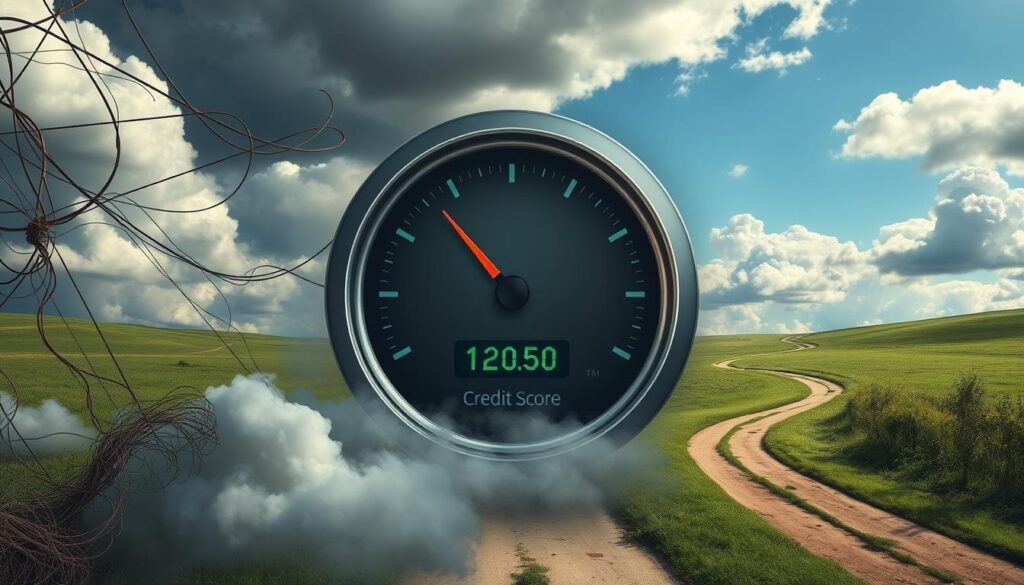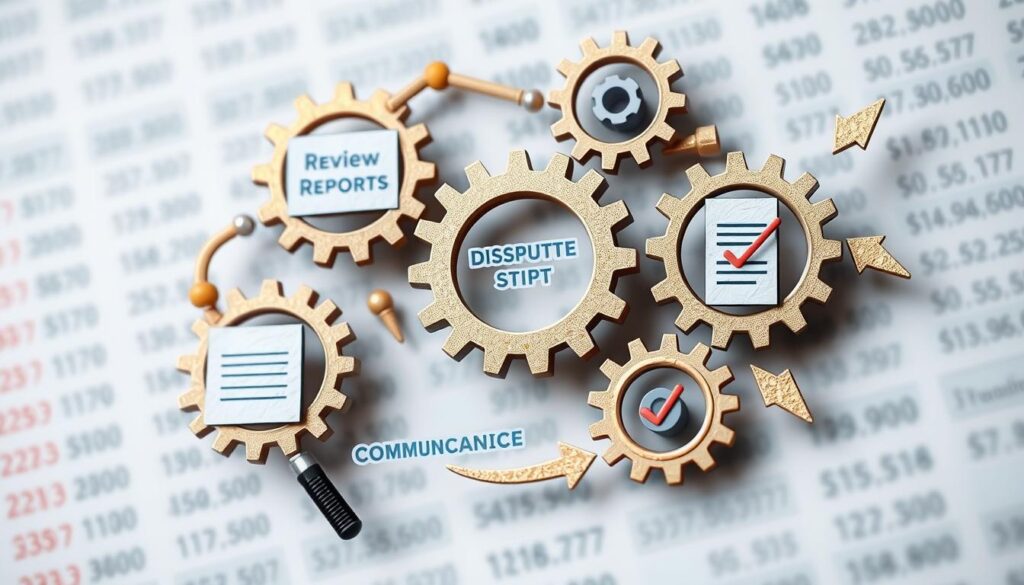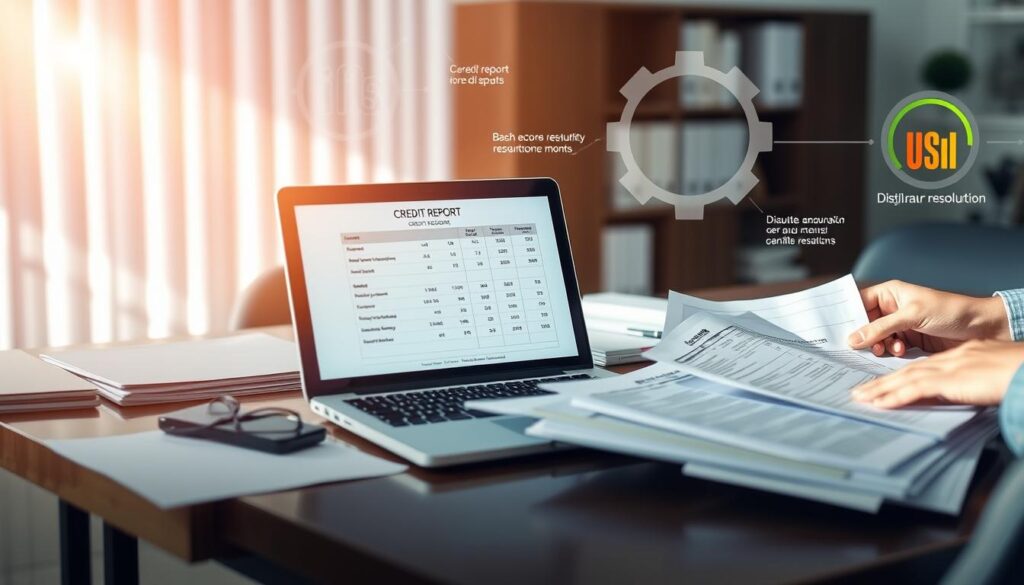Your credit score greatly impacts your financial health. It determines your loan eligibility and interest rates. What if you find errors in your credit report? Let’s explore how credit disputes can affect your creditworthiness.
We’ll uncover the truth about credit disputes and your score. We’ll examine the dispute process, common reasons for disputes, and potential impacts on your credit.
Key Takeaways
- Disputing inaccurate information in your credit report can have a positive impact on your credit score.
- Legitimate negative information that is correctly reported may initially lower your score when disputed, but can lead to a higher score in the long run.
- The credit dispute process involves working with the credit bureaus to investigate and resolve any errors or discrepancies in your credit report.
- Understanding your rights under the Fair Credit Reporting Act is crucial when navigating the credit dispute process.
- Perseverance and proper documentation are key to effectively resolving credit disputes and maintaining a healthy credit profile.
Understanding Credit Disputes
Credit disputes are vital for maintaining accurate credit reports. They allow you to challenge wrong or incomplete information. This process helps protect your financial reputation.
What is a Credit Dispute?
A credit dispute is a formal request to fix errors on your credit report. You can file it with credit agencies like Experian, Equifax, or TransUnion.
The Fair Credit Reporting Act (FCRA) governs this process. It gives you the right to dispute and remove inaccurate information.
Reasons for Disputing Credit Report Information
- Inaccurate information: This includes errors in your personal information, account history, or payment records.
- Incomplete information: Your credit report may be missing key details about your credit history, such as closed accounts or resolved disputes.
- Unverified information: The credit bureau may be unable to verify the accuracy of certain items on your report, which should then be removed.
- Fraudulent activity: If you suspect identity theft or other unauthorized use of your credit, you can dispute these items to protect your credit history.
Understanding credit disputes empowers you to maintain accurate credit history. It helps you protect your financial well-being. Taking an active role in this process is crucial.
The Impact of Disputes on Credit Scores
Credit score management can be tricky, especially when dealing with disputes. These disputes can significantly affect your creditworthiness. Understanding their impact is key to maintaining a healthy financial profile.
Credit disputes can boost or lower your credit score. The outcome depends on the dispute’s nature and resolution.
Positive Impacts of Credit Disputes
- Correcting inaccurate information on a credit report can lead to a positive boost in the credit score, as the report becomes a more accurate reflection of the individual’s creditworthiness.
- Successfully disputing legitimate negative information, such as late payments or collections, can help improve the credit score over time as the negative item is removed from the report.
Negative Impacts of Credit Disputes
- The credit dispute process itself can temporarily lower a credit score, as the investigation by the credit bureaus is ongoing.
- If a dispute is unsuccessful and the negative information remains on the credit report, it can continue to have a detrimental effect on the individual’s credit score.
The impact of disputes varies based on your overall credit history. It also depends on the type of information disputed.
The outcome of the dispute process plays a crucial role too. Each case is unique and can affect your score differently.
| Dispute Outcome | Impact on Credit Score |
|---|---|
| Successful dispute of inaccurate information | Positive impact: Improvement in credit score |
| Unsuccessful dispute of legitimate negative information | Negative impact: Continued low credit score |
| Temporary impact during dispute investigation | Negative impact: Temporary decrease in credit score |
Knowing how disputes affect your credit score is crucial. It helps you make smart financial decisions.
With this knowledge, you can develop strategies to maintain a strong credit profile. Stay informed and proactive about your credit health.

Do Disputes Affect Credit Score?
Credit disputes can be tricky. They can help or hurt your score. It depends on what you’re disputing and why.
Disputing Inaccurate Information
Spot errors in your credit report? Dispute them right away. Credit bureaus must investigate and fix verified mistakes.
Removing wrong negative items can boost your score. This can improve your overall credit profile.
Disputing Legitimate Negative Information
Disputing true negative info isn’t smart. Late payments and bankruptcies reflect your real credit history. Trying to remove valid negatives rarely helps your score.
It might even look like you’re trying to cheat the system. This could harm your creditworthiness.
Credit disputes aren’t magic fixes. They work best for real errors. Focus on fixing genuine mistakes in your report.
This approach helps maintain a healthy credit profile. It can lead to better financial opportunities down the road.
The Credit Dispute Process
Understanding the credit dispute process is vital for your financial health. It helps maintain accurate credit reports and protects your financial wellbeing. This process is key to resolving inaccurate or negative items on your report.
Initiating a Credit Dispute
Start by identifying incorrect information on your credit report. Then, file a dispute with the credit bureau reporting that information. This step is crucial for addressing any errors on your report.
Credit Bureau Investigations
Credit bureaus investigate your dispute upon receiving it. They contact the data furnisher to verify the disputed item’s accuracy. This investigation usually takes 30 to 45 days to complete.
The bureau will update you throughout the process. They’ll provide a final decision on your dispute’s outcome. If the information is wrong or can’t be verified, they must remove or update it.

Credit disputes can be complex and time-consuming. However, understanding the steps and being persistent can lead to positive results. Follow the procedures and provide necessary documentation to effectively manage your dispute.
Credit Report Errors and Disputes
Credit report errors can greatly affect your creditworthiness. These inaccuracies make it vital to address and dispute inaccurate information on credit reports. Errors can harm your ability to get loans and credit cards.
A Federal Trade Commission study found startling results. Approximately 1 in 5 consumers have verified errors on their credit reports. These mistakes range from wrong personal info to incorrect account details.
Sometimes, fraudulent accounts appear on credit reports. Such credit report errors can unfairly lower credit scores. This makes it harder to get good terms on loans and credit cards.
| Common Types of Credit Report Errors | Potential Impact |
|---|---|
| Inaccurate personal information (name, address, etc.) | May affect credit application approval and terms |
| Incorrect account details (balance, payment history, etc.) | Can lead to lower credit scores and unfavorable lending decisions |
| Inclusion of fraudulent or unauthorized accounts | Significantly harms creditworthiness and credit score |
Resolving credit disputes is crucial for financial health. Regularly review your credit reports for accuracy. Take quick action to dispute inaccurate information when you find it.
By fixing credit report errors, you protect your financial well-being. This helps maintain a strong credit profile for future opportunities.
“Checking your credit report regularly and disputing any errors is one of the most important steps you can take to protect your financial future.”
Resolving Credit Disputes
Credit disputes can be tricky, but they’re vital for a healthy credit profile. Spotting errors on your credit report? Take action right away. Your credit information must be accurate.
Providing Supporting Documentation
Strong evidence is key in credit disputes. Gather copies of bills and statements that show the error. Submit this proof to boost your chances of successful resolution.
Dealing with Unresolved Disputes
Sometimes, disputes remain unsettled even with proper documentation. Don’t give up! You have options to keep fighting.
Try escalating to the credit bureau’s supervisory team. You can also contact the creditor directly. Consider seeking help from consumer protection agencies or a lawyer.
Credit disputes take time and can be frustrating. But they’re crucial for a healthy credit profile. Stay persistent and protect your financial history.

| Steps to Resolve Credit Disputes | Key Considerations |
|---|---|
|
|
“Resolving credit disputes can be a time-consuming process, but it’s essential for maintaining a healthy credit profile.”
Fair Credit Reporting Act and Disputes
The Fair Credit Reporting Act (FCRA) sets rules for credit reporting. It protects consumer rights in credit disputes. This law empowers people to resolve credit issues.
The FCRA allows consumers to dispute wrong credit report info. Credit bureaus must investigate disputes quickly. This helps keep credit reports accurate.
Credit bureaus have 30 days to look into disputes. They must fix or remove wrong info. Consumers can add dispute statements to their files.
- The FCRA mandates that credit bureaus must investigate disputes within 30 days and provide a written response to the consumer.
- If the disputed information is found to be inaccurate, the credit bureau must correct or delete it from the consumer’s credit report.
- Consumers also have the right to request that a statement of the dispute be included in their credit file, which will be provided to anyone requesting their credit report.
Knowing FCRA rules helps people handle credit disputes better. They can fix errors in their credit reports more easily.
“The Fair Credit Reporting Act is a critical piece of legislation that safeguards consumers’ right to accurate and fair credit reporting.”
Using FCRA rules can help you manage your credit history. It ensures your credit report shows your true financial picture.
Credit Repair Services and Disputes
Credit repair services help resolve disputes and improve credit scores. They tackle inaccuracies on credit reports. These services can be valuable for those struggling with credit issues.
These companies have expertise in navigating the credit dispute process. They can identify and challenge unfair information on your report. This may lead to an improvement in your credit score.
However, credit repair services have limitations. They can’t guarantee specific outcomes or major score boosts. Success depends on the case’s merit and credit bureaus’ response.
Legal requirements apply to credit repair services. They must follow the Fair Credit Reporting Act (FCRA). Clear disclosures about services and fees are mandatory.
Research a credit repair service’s reputation before hiring. Understanding their capabilities is crucial. With the right service, you can boost your chances of resolving disputes.

| Service | Description | Potential Impact on Credit Score |
|---|---|---|
| Dispute Inaccurate Information | Credit repair services can help identify and dispute inaccurate or unfair information on your credit report. | Successful disputes can lead to the removal of negative items, potentially improving your credit score. |
| Negotiate with Creditors | Credit repair services may negotiate with creditors to remove or modify negative items on your credit report. | Favorable negotiations can result in the removal or improvement of negative information, positively impacting your credit score. |
| Provide Credit Monitoring | Some credit repair services offer credit monitoring services to help you stay informed about changes to your credit report. | Regular monitoring can help you identify and address any new inaccuracies or negative items, maintaining a healthy credit score. |
Monitoring Credit Reports After Disputes
Regular credit report checks are vital, even after resolving disputes. Errors can reappear, affecting your credit score. Stay alert to maintain your credit history’s accuracy.
Get credit reports from Equifax, Experian, and TransUnion. Check if disputed info is updated or removed. If issues persist, file another dispute right away.
- Set reminders to review your credit reports at least once every six months.
- Monitor your credit score regularly to track any changes that may result from the resolved disputes.
- Stay informed about your credit rights and the Fair Credit Reporting Act, which provides protections against credit report errors and unresolved credit disputes.
Watching your credit reports helps protect your credit score. It ensures the dispute resolution process worked. Staying informed helps reduce the impact of past issues.
“Regularly checking your credit reports is the best way to catch and correct any credit report errors that may arise, even after a dispute has been resolved.”
Disputing Credit History for Better Scores
Credit disputes can be tricky, but they’re vital for boosting your credit score. By challenging wrong info on your report, you can improve your credit history. This can lead to a higher credit score.
To dispute credit history, be thorough and patient. Start by checking your credit report for errors. Then, begin the dispute process with credit bureaus. This process can take time, but the potential benefits make it worth the effort.
Strategies for Effective Credit History Disputes
- Gather supporting documentation: Collect any relevant evidence, such as payment records or correspondence with creditors, to strengthen your case.
- Communicate with the credit bureaus: Follow the credit dispute process outlined by each bureau, ensuring your disputes are submitted in a timely and organized manner.
- Be persistent: Don’t get discouraged if your initial dispute is not resolved to your satisfaction. Continue to follow up and provide additional information as needed.
Successfully fixing credit history disputes can boost your credit score. This can lead to better loan terms and lower interest rates.
It can also open doors to improved financial opportunities. Your efforts can pay off in many ways.
| Dispute Type | Potential Impact on Credit Score |
|---|---|
| Disputing Inaccurate Information | Significant increase in credit score |
| Disputing Legitimate Negative Information | Moderate increase in credit score |
Resolving credit disputes is key to maintaining a healthy credit score. By fixing errors on your report, you can build a brighter financial future.
Tips for Effective Credit Disputes
Credit disputes can be tricky, but the right approach can boost your success. Here are key tips to help you challenge credit report errors effectively.
Keeping Records
Detailed record-keeping is vital when disputing credit report info. Document each step, from your initial dispute to follow-up talks. Keep copies of all written messages and supporting documents.
Also, log any phone calls or interactions with credit bureaus and creditors. This evidence can greatly strengthen your case.
Being Persistent
Resolving credit disputes often takes time and can be frustrating. But don’t give up. If your first dispute fails, follow up with the bureau or creditor.
Be ready to provide more proof to back your claim. Remember, you have the right to challenge wrong info on your report.
Credit bureaus must investigate your dispute by law. Your financial health is worth the effort.
By keeping records and staying persistent, you can better handle resolving credit disputes. This approach helps with providing supporting documentation and dealing with unresolved disputes.
Conclusion
Credit disputes can affect your credit score in various ways. The impact depends on the dispute’s nature and the investigation’s outcome. It’s important to understand how this process works.
Regular monitoring of your credit report is crucial. Look for any errors or inaccuracies. Resolve these issues promptly to protect your credit score.
Be persistent and thorough when dealing with credit disputes. Use reputable credit repair services if needed. This approach ensures your credit report accurately reflects your financial history.
By taking these steps, you can maintain a healthy financial profile. This will set you up for greater financial success in the future.

